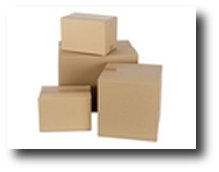 It must be quite evident for most of us that there is an over-packaging syndrome in the retail industry. When I look at the goods I purchase from conventional, non-organic stores, I find it shocking how much paper and plastic is used to unnecessarily wrap goods. The only people benefitting from this absurd situation are designers because the consumer is left with the task of recycling waste that it didn’t want in the first place. A surreal example: I once saw at Tesco, England’s equivalent of Wal-Mart, a plastic case containing one banana! A banana, of all fruits, which has been blessed with a beautiful, natural skin that makes it a perfect snack for people on the go.
It must be quite evident for most of us that there is an over-packaging syndrome in the retail industry. When I look at the goods I purchase from conventional, non-organic stores, I find it shocking how much paper and plastic is used to unnecessarily wrap goods. The only people benefitting from this absurd situation are designers because the consumer is left with the task of recycling waste that it didn’t want in the first place. A surreal example: I once saw at Tesco, England’s equivalent of Wal-Mart, a plastic case containing one banana! A banana, of all fruits, which has been blessed with a beautiful, natural skin that makes it a perfect snack for people on the go.
So I was happily surprised to see that Wrap has been successful in leading the Courtauld Commitment, an agreement between the organization and major grocery organisations to initiate new packaging solutions and technologies so that less trash ends up in the household bin. The organization says the agreement is a “powerful vehicle for change and will result in real reductions in packaging and food waste”.
I’m sure most consumers will agree with that.
Among the latest signatories are the brands: Britvic, Cadbury Schweppes, Coca-Cola Enterprises Ltd, Dairy Crest, Duchy Originals, Mars UK (formerly Masterfoods), McBride, Nestlé UK and Premier Foods. The first brands to sign up in July 2005 were Asda, Boots, Budgens, the Co-operative Group, Londis, Iceland, Kwik Save, Marks & Spencer, Morrison’s, Sainsbury’s, Somerfield, Tesco and Waitrose, which represents 92% of the UK grocery market. HJ Heinz, Unilever and Northern Foods signed last year. In total, 25 major organizations have signed up.
Meanwhile, my suggestion is that we don’t buy products that are clearly over-packaged in order to send a message to those retailers that don’t care about the environment. Let them slip on the banana skins of their irresponsibility.





